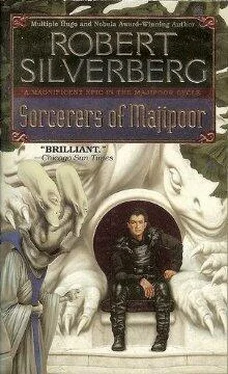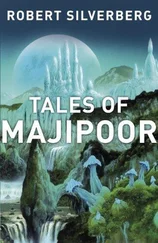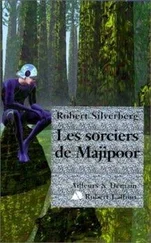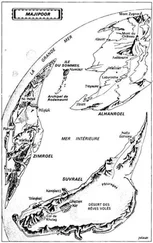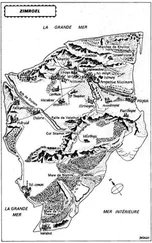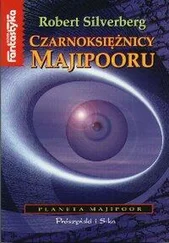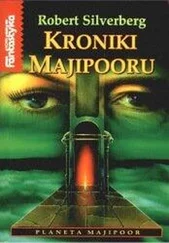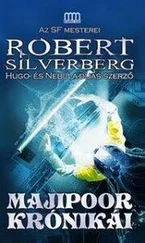There they found a traveler staying at their inn who suggested that they go south to Sisivondal next, and drew a little chart for them showing how it would avoid the difficult crossing of the Trikkala Mountains if they did that. “You are very kind,” said Thismet, smiling, a phrase and a smile which he mistook, putting his hand boldly on her thigh as they sat together at table, so that she had to let him see the dagger strapped within the sleeve of her blouse. After that he was more polite. But the imprint of that roaming hand burned against her skin for hours thereafter.
They went to Sisivondal. It was the ugliest place Thismet had ever seen. Not even in nightmares had she conceived anything more hideous. This time their hotel room was a barren stuffy box. It seemed all but airless; but when they opened the window, a fine rain of sand came sifting in on them.
Roads led from Sisivondal in all directions. A maze of signs confronted them.
“Which way is Gloyn?” Thismet asked, dispirited. “I never imagined that Majipoor was so big!”
“It is the biggest world in all the heavens,” said Melithyrrh. “The biggest where people of the human sort can live, at least.”
“And we must travel it alone, two pampered women.”
“It was our choice, lady.”
“Yes. There was no other, was there?”
No. No choice. She knew she had come to the end of her time at the court, that place which once had been so lovely and had somehow been transformed into a place of disappointment and rebuke. Already the Castle and all its horrors seemed far away: the skulking leering Farquanor, the snorting bestial Procurator, the treacherous mages, the noble brother who had treated her so ignobly when she had asked him for a place in his government. She scarcely missed her jade drawing room and her alabaster tub, her robes and bangles, her whole luxurious empty life. She was done with all that. It was dead. Over. A new life was what she sought now, and would find in the west. But still—this endless wearying journey—that impudent hand on her thigh, burning like a flame—the shabby hotels, the dreary roads, the ghastly food—
The territory around Sisivondal was a vast dusty wasteland. A dry hot dusty wind blew across it all the time. They kept the floater sealed tight, and yet, when Thismet glanced at Melithyrrh, she could see Melithyrrh’s golden hair coated with a sandy film, and knew that hers must be like that also. Grit in her eyes, grit between her teeth, grit along her arms and down between her breasts. Her skin was dry; her throat was dry. Her soul itself was parched. She had never felt so filthy, so bedraggled, so unglamorous, so little like anything that anyone would recognize as the Lady Thismet of Lord Confalume’s Castle. They drove on and on, praying that this grim sandy plain would come to an end eventually; and eventually it did, and the air grew sweet and the world became Majipoor-beautiful again.
“We are nearing Gloyn at last, I hope,” Thismet said one magnificent sunlit morning as they passed through a land of glistening green fields.
They stopped for information at a farm where some mysterious-looking plant with purple leaves was being grown in fields that stretched onward, one after another, out of sight. Gloyn? Gloyn? Ah, yes, Gloyn! That was on the road to Marakeeba, was it not? Well, then, they had passed the highway for Gloyn seven hundred miles ago. Go back to Kessilroge, turn right there and go three hundred miles, watch for signs for Gannamunda, and at Gannamunda look for the Hunzimar Highway—Very well. Back to Kessilroge.
The Vale of Gloyn was the place where Prestimion’s army lay encamped, a great broad savanna in west-central Alhanroel, almost equidistant between the Mount and the seacoast at Alaisor. All this flat peaceful land was covered by huge carpets of coppery-hued, shin-high gattaga-grass, the blades of which were so close-knit and thick that when you walked upon ityou left a trail that could be seen half an hour afterward; and those hundreds of miles of gattaga-grass were home to immense herds of grazing animals that lived there as they had a hundred thousand years before, or a million.
Duke Svor, who had ridden out of camp alone that day, was standing near the sharp peak of one of the dwarf mountains that were scattered across the plain, ship-sized piles of rock eighty or a hundred feet high rising like little stony islands above the grass. From that vantage point he looked out now on these herds in wonder.
The gattaga-grass spread to the limits of his vision. Here, close at hand, were ten or twenty or fifty thousand of the large, stocky, flat-faced quadrupeds called klimbergeysts, whose hides were dappled with shifting patterns of red and gold. They looked like so many thousands of sunsets wandering freely in the plain. Off to his left was a glade of tall, spiky gray trees where dozens of long-necked browsers that stood close to fifty feet high were feeding on the tender top leaves. He had no idea of the name of these animals. Their long slender legs were rigid and angular, with three sets of equidistant knees; their necks were as flexible as serpents, topped by heads that were little more than gigantic mouths and dim, uneasy eyes. Untiringly, they ripped the soft growth from the towering trees, and just as untiringly the trees put forth new leaves as soon as the browsers passed by.
On the other side of him Svor observed a squat tank-shaped thing with gleaming armored hide, not very different in appearance from a mollitor but obviously much less warlike, moving placidly along the margin of a swampy area where the pink shoots of some water plant were sprouting. Beyond it, at the opening of a secondary valley that had two of the little island-mountains serving as its gateway, he saw another huge grazing herd, these being the broad-nosed piglike animals called vongiforin, snuffling about in the gattaga for the small sweet seeds on which they fed. The sun was warm and mild; fleecy clouds drifted overhead; a light soft breeze was blowing out of the south.
An idyllic scene, Svor thought.
Almost idyllic anyway. He noted the presence, atop one of the nearby island-mountains, of a trio of slim, tawny hunting-animals, kepjitaljis, who were eyeing the grazing vongiforin with interest. The kepjitaljis—a mother and two cubs, he supposed—were long and tapering, with harsh wedge-shaped heads, bright eyes like red stars, fierce-clawed forearms, and great powerful hind legs that could propel them swiftly forward in inexorable hopping motions. He had seen the same trio two days before, lying growling and bloody-mouthed in a heap of gnawed ribs. No doubt they would be feeding again before very long.
Behind him, on the far side of the miniature mountain that he had made his lookout post, was Prestimion’s camp.
This new army was bigger than any of its predecessors, and continued to grow daily as volunteers from every part of Alhanroel came flocking to the rebel banner. Survivors of Prestimion’s shattered army from the Iyann had been the first to enroll, and there were more of those than Prestimion had dared to suspect gathered here, once again, were Duke Miaule of Hither Miaule, and golden-haired Spalirises of Tumbrax, and sturdy Gynim of Tapilpil with his band of sling-casters, and many others of that hardy crew, every one of them brimming with tales of their escape from the raging floodwaters and all athrob with desire for vengeance on the cowardly enemy who had brought the reservoir tumbling down upon them.
But there were others now, myriad others: a legion of men from the southern lands, Stoien and Aruachosia and Vrist, and a host from misty Vrambikat, which was far to the east on the other side of Castle Mount, and men of towns at the base of the Mount itself, Megenthorp and Bevel and Da, and troops of the city of Matrician, where Fengiraz, whose mother had been the dearest childhood friend of Prestimion’s mother, had his flourishing dukedom, and Gornoth Gehayn and his fearless sons, with their trained hieraxes, out of the west country to serve as airborne spies. And still more came every day; and every day Prestimion and Gialaurys and Septach Melayn toiled from dusk to dark to weld them into a single force that would shortly begin its march eastward to make war against the false Coronal.
Читать дальше
